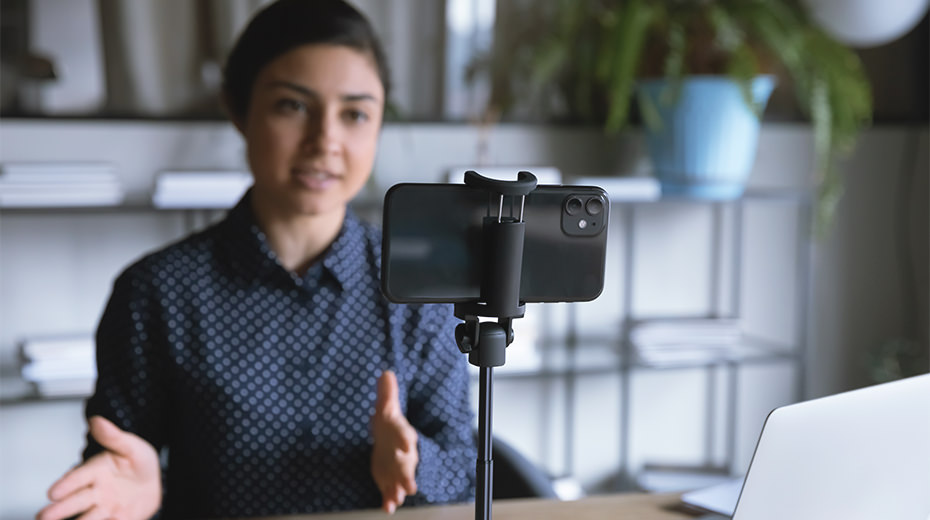The Virtual Event Evolution: The Future of Hybrid Events

Share this story
Back in April of 2020, MX, along with B2B organizations across the globe, faced a stunning level of uncertainty regarding anything that included physical human interaction due to the COVID-19 pandemic. By that time in 2020, many companies already made the decision to explore remote working or a hybrid work model. Words and phrases like “pivot,” “new normal” and “unprecedented times” flooded our emails, news coverage and daily activities. From an event planning standpoint, this was a level of disarray not even the most seasoned event planner could have predicted.
Event planners are the definition of nimble. They create a plan A, plan B, C, D, E, F and perhaps even a G. However, the pandemic required event planners to enter a certain shade of gray that made even the most agile wary. Event planners had to step out of the comfort zone of deadlines and schedules of the physical world and boldly jump into a new realm of exploring event platforms that supported online events and virtual conferences.
...virtual events are here to stay but are facing their own transformation into hybrid meetings.
In mid-March 2020, Gartner research revealed that 68% of chief marketing officers (CMOs) had canceled or postponed customer-facing marketing events in response to the COVID-19 pandemic. The number of cancellations only continued to grow as travel bans increased, stay-at-home orders were issued and employees began working remotely. The cancellations drove marketers to explore the path of B2B online events to keep up with brand awareness and lead volume. Flash forward to May 2021 when, with the rollout of nationwide vaccines, COVID-19 restrictions started to roll back. Demand Gen reported, “Marketers are eager to get back to business with some semblance of normal. However, this return to normalcy is somewhat paradoxical, because although the industry is growing restless behind its screens, work-related travel isn’t high up on to-do lists.” This means that virtual events are here to stay but are facing their own transformation into hybrid meetings.
The “New Normal”
By now, every organization has realized the benefits of online events. The virtual world offers low overhead and financial savings, the ability to reach a wider audience and more access to talent and experts. The downside is the virtual field is now so inundated with conferences, it is starting to put a strain on people’s schedules and attention spans. As a result, marketers are exploring the idea of a hybrid meeting or conference. According to Aventri, an event management software company, “Almost 89% of event organizers have claimed that even when in-person meetings resume post-pandemic, virtual or hybrid events will remain a critical part of their event strategy.” So, despite the strain and battle for attentions, virtual and hybrid events are here to stay.
89%
of event organizers share that post-pandemic, virtual or hybrid events will remain a critical part of their event strategy.
Aventri
Previously, we defined a virtual event as any organized experience that happens online rather than in person. Virtual events can take a variety of shapes — from a highly interactive, multi-day event that tries to mimic the experience of a big conference in a web-based format, to a variety of other web-based strategies to deliver shorter content like trainings, sales presentations and meetings. Some might even call a webinar a virtual event. The mechanics and formats of these events can be just as varied, from live streaming to a curated series of on-demand videos with interaction and networking built into the event platform.
But, to be clear, harvesting some old (or even new) branded recordings just to gain a bunch of new email addresses does not constitute a virtual event.

Virtual events include:
- “Ask me anything” (AMA) events
- Facebook or LinkedIn Live events
- “Virtual coffee” events
- Interactive user groups
- Live demos (not just for software — could you give a walk-around of a big industrial drive?)
- Expert panels
- Multi-day conferences, complete with keynote sessions, breakouts, case studies, a virtual exhibit hall, networking breaks, and other elements that simulate live events
- And yes: webinars
So, what is a hybrid event?
To put it simply, a hybrid event is an occasion that allows for both in-person and virtual audiences. Folks can attend a physical location to view live content. Or, audiences have the option to participate remotely with online events. The remote option can be live and streaming, it can be available later on-demand, or both. Hosting a hybrid meeting, especially for B2B marketers, has a slew of advantages that include:
- The potential of an increased, wider audience — helps grow brand recognition.
- More efficient methods to track and gather data on attendees through registration — enables sales leads.
- Real-time analytics to improve outcomes — helps identify potential issues like navigating traffic to a particular sponsor’s virtual booth that is experiencing low attendance.
For some, the easy mistake is to assume a hybrid event allows for both the virtual audience and the in-person audience to view the same content at the same time. According to some leading B2B marketers, that is too much of a simplistic view and drastically reduces the effectiveness of the event. While some content can be viewed by both audiences, it is important to vary the experiences. To help marketers achieve the best outcome, Demand Gen Report recently interviewed B2B market leaders and outlined some best practices to follow when shaping your hybrid event.

It’s All About the Journey
When B2B marketers prepare to create a hybrid event, they should avoid the notion that the content shared at each component of the event (in-person and online) is independent. Instead, think of each component as a stop in the journey of your digital content strategy — a strategy that allows for the conversation at each of these occurrences to grow and develop based off the content. “Imagine how events would change if we thought of them as just one element in an ongoing digital content strategy. Event’s websites would reflect that ongoing conversation with social conversations centered on a hashtag or podcast. Previous and future speakers would participate in regular ‘round-ups’ like this one. The event host would publish amazing and helpful content,” said Michael Brenner, CEO of Marketing Insider Group.

Progressive, Not Parallel
B2B marketers should stray from the idea of delivering identical content to both in-person and virtual audiences. You want the conversation throughout the course of your content strategy to build. The online events and in-person portions should be viewed as episodes in a series that stimulate ongoing conversations. Expand your event marketing strategy by creating virtual pre-show moments that allow the audience to get to know the speakers and content. During the event, get creative with your filming direction. Use more than one angle and ask speakers to directly address the camera. Finally, follow up from the in-person event with virtual workshops, touch-bases and roundtables that invite interested parties to reunite and reignite the conversations about the content.

Measuring Success
Traditionally, event organizers would measure success based on registration. Increased registration numbers equaled popularity and effectiveness. The evolution of virtual event technology and event platforms has unlocked more possibilities to measure achievements. We can now capture data from registration to individual touchpoints across the entirety of the attendee’s journey, making event technology become part of the marketing stack. According to Michael Balyasny, co-founder and CEO of Attendify, “The role of technology will be in helping marketers and planners understand attendee behavior at a deeper level than was previously possible. Those signals will be used for everything from personalizing experiences and identifying intent, to driving marketing and retention campaigns to grow events.”

Make It Personal
Hybrid meetings should allow folks to connect with peers and experts in their industry and fields of interest. Use the data we discussed above to pair attendees with the right opportunities to advance their content journey experience. Create occasions for attendees to learn from each other rather than just one subject matter expert through live roundtables and fireside chats. If an attendee cannot attend the live portion of the discussion, then provide them with moments of hyper-relevant content. Encourage the conversation to keep going offline and include captured key insights and schedule follow-up Q&A.

Connect and Engage
Play to the strengths of each element your hybrid event has to offer. For the physical portions, remember what keeps people engaged for in-person events is something exciting and dynamic. If your audience can easily stream a panel discussion, they are probably going to prefer doing that from the comfort of their home. In-person segments should be exciting with a focus on “in the moment” conversations to help create a sense of FOMO (fear of missing out). “Imagine a world where the physical event is shorter, bigger and bolder, giving attendees the sizzle they expect from a live mainstage production … They (the attendees) come for connection and an experience. The in-person portion of the ideal hybrid meeting trims content and presentations and instead focuses on networking and social opportunities interspersed with mainstage content that can’t be replicated elsewhere,” said Tessa Barron, VP of marketing for ON24.
Make sure to give in-person attendees the option to engage digitally with event apps, virtual chat and Q&A sessions. You want to give your attendees the chance to experience your event on their own terms and provide them with multiple options to get in touch with your company — thus more options for you to gather data. Vary the experiences to keep people entertained and engaged. Whether they are virtual or in person, your attendees should leave feeling energized and ready to follow you on your content strategy journey.
